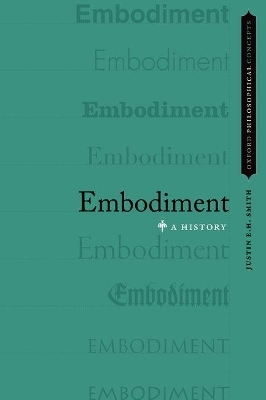
Embodiment
Oxford University Press Inc (Verlag)
978-0-19-049045-4 (ISBN)
But insofar as there is a philosophical problem of embodiment, the identity of the embodied subject with the body stands in need of an argument and cannot simply be assumed. The reasons, nature, and consequences of the embodiment of subjects as conceived in the long history of philosophy in Europe as well as in the broader Mediterranean region and in South and East Asia, with forays into religion, art, medicine, and other domains of culture, form the focus of these essays. More precisely, the contributors to this volume shine light on a number of questions that have driven reflection on embodiment throughout the history of philosophy. What is the historical and conceptual relationship between the idea of embodiment and the idea of subjecthood? Am I who I am principally in virtue of the fact that I have the body I have? Relatedly, what is the relationship of embodiment to being and to individuality? Is embodiment a necessary condition of being? Of being an individual? What are the theological dimensions of embodiment? To what extent has the concept of embodiment been deployed in the history of philosophy to contrast the created world with the state of existence enjoyed by God? What are the normative dimensions of theories of embodiment? To what extent is the problem of embodiment a distinctly western preoccupation? Is it the result of a particular local and contingent history, or does it impose itself as a universal problem, wherever and whenever human beings begin to reflect on the conditions of their existence?
Ultimately, to what extent can natural science help us to resolve philosophical questions about embodiment, many of which are vastly older than the particular scientific research programs we now believe to hold the greatest promise for revealing to us the bodily basis, or the ultimate physical causes, of who we really are?
Justin E. H. Smith is professor in the department of history and philosophy of science at the Université Paris Diderot - Paris 7. He is the author of The Philosopher: A History in Six Types (2016), Nature, Human Nature, and Human Difference: Race in Early Modern Philosophy (2015), and Divine Machines: Leibniz and the Sciences of Life (2011), all from Princeton University Press.
Contributors
Series Editor's Foreward
Introduction, Justin E.H. Smith
1. "The Body of Western Embodiment: Classical Antiquity and the Early History of a Problem" Brooke Holmes
2. "Embodied or Ensouled: Aristotle on the Relation of Soul and Body" Helen Lang
3. "Asceticism and Aestheticism: The Paradox of Embodiment in Plotinus' Enneads" Lesley-Anne Dyer Williams
4. "Augustinian Puzzles about Body, Soul, Flesh, and Death" Sarah Byers
5. "Medieval Jewish Philosophers and the Human Body" Yoav Meyrav
6. "Scholastic Philosophers on the Role of the Body in Knowledge" Rafael Nájera
7. "Hobbes's Embodied God" Geoffrey Gorham
8. "Leibniz's View of Individuals: Nested or Embodied Individuals" Ohad Nachtomy
9. "Descartes and Spinoza: Two Approaches to Embodiment" Alison Peterman
10. "Man-Machines and Embodiment: From Cartesian Physiology to Claude Bernard's 'Living Machine'" Philippe Huneman and Charles T. Wolfe
11. "The Embodiment of Virtue: Towards a Cross-Cultural Cognitive Science" Jake H. Davis
Reflections
1. "The Devil in the Flesh: On Witchcraft and Possession" Véronique Decaix
2. "Phantom Limbs" Stephen Gaukroger
3. "Embodied Geometry in Early Modern Theatre" Yelda Nasifoglu
4. "Ghosts in the Celestial Machine: Embodiment in the Late Renaissance" Jonathan Regier
5. "The Genotype/Phenotype Distinction" Emily Herring
| Erscheinungsdatum | 11.07.2017 |
|---|---|
| Reihe/Serie | Oxford Philosophical Concepts |
| Verlagsort | New York |
| Sprache | englisch |
| Maße | 137 x 206 mm |
| Gewicht | 440 g |
| Themenwelt | Geisteswissenschaften ► Philosophie ► Geschichte der Philosophie |
| Geisteswissenschaften ► Philosophie ► Metaphysik / Ontologie | |
| Geisteswissenschaften ► Philosophie ► Philosophie der Neuzeit | |
| ISBN-10 | 0-19-049045-4 / 0190490454 |
| ISBN-13 | 978-0-19-049045-4 / 9780190490454 |
| Zustand | Neuware |
| Haben Sie eine Frage zum Produkt? |
aus dem Bereich


